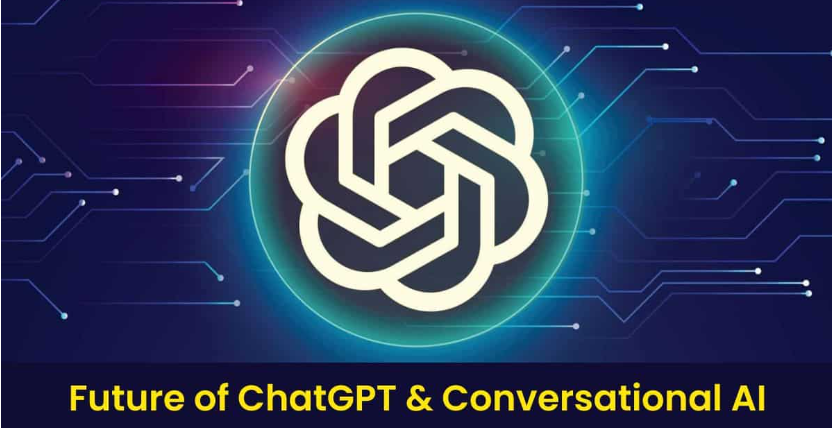The Future of CHATGPT

“The future of ChatGPT is a world where human-machine conversations seamlessly blend, empowering us to accomplish more and enriching our lives in unimaginable ways.”
The Future of ChatGPT is a topic that is generating a lot of excitement in the tech community. the Future of ChatGPTs an exciting and rapidly evolving field that is worth paying close attention to.
INTRODUCTION
In the realm of conversational AI, ChatGPT has emerged as a game-changer, but its future holds even greater promise. As we peek into what lies ahead, we envision an enhanced ChatGPT that exhibits improved contextual understanding, expanded domain expertise, personalized interactions, and a steadfast commitment to ethical considerations.
ARTIFICIAL INTELLIGENC
It has been a rapidly evolving field over the past few decades, leading to the development of some of the most sophisticated systems we have today. One of the most significant advancements in AI has been the creation of conversational AI, which has the ability to interact with human beings in natural language. The advent of conversational AI has been game-changing and has led to the development of numerous innovative applications that have transformed various industries, including healthcare, finance, retail, and customer service.
Future of ChatGPT in conversational AI customer service.
One of the areas where we see Future of ChatGPT is likely to have a significant impact is in customer service. As the model becomes more sophisticated, it will become increasingly capable of handling complex customer inquiries, reducing the need for human customer service representatives. This could lead to significant cost savings for businesses and improved customer satisfaction through faster and more accurate responses.
Future of ChatGPT in language translation
Another area where we see future of ChatGPT is likely to have a major impact is in language translation. As the model becomes better at understanding and generating language, it has the potential to revolutionize the way people communicate across linguistic barriers. This could have far-reaching implications for global trade, travel, and diplomacy.
Future of ChatGPT in Creative Content writing
Another area where ChatGPT makes more impact is in creative writing. The model has been trained on a vast corpus of text, which allows it to generate text on a wide range of topics. This has led to some creative applications, such as poetry and fiction writing, where the model can be used to generate ideas and even complete pieces of writing. While it is unlikely that ChatGPT will replace human writers anytime soon, it has the potential to be a valuable tool for writers looking for inspiration or new ideas.
Future of ChatGPT in Creative Education
Another area where we see bright future for ChatGPT and conversational is likely to have a major impact is in education. The model has the ability to understand and respond to a wide range of questions, which makes it an excellent tool for students looking for information or clarification on a particular topic. This could lead to a more personalized and engaging learning experience, as students are able to get answers to their questions in real-time. Additionally, ChatGPT could be used to automate the grading of certain types of assignments, freeing up time for teachers to focus on other aspects of the learning process.
Future of ChatGPT in impacting our personal life
The potential benefits of ChatGPT and conversational AI are not limited to businesses and education. The technology has the potential to improve our personal lives as well. For example, ChatGPT could be integrated into virtual personal assistants, allowing us to interact with our devices in a more natural and intuitive way. Additionally, the model could be used to generate personalized recommendations for things like music, books, and movies, based on our individual preferences and history.
THE BRIGHT FUTURE OF CHATGPT
In the realm of conversational AI, ChatGPT has emerged as a game-changer, but its future holds even greater promise. As we peek into what lies ahead, we envision an enhanced ChatGPT that exhibits improved contextual understanding, expanded domain expertise, personalized interactions, and a steadfast commitment to ethical considerations.
Future iterations of ChatGPT will feature a remarkable leap in contextual understanding, enabling more coherent and meaningful conversations. With advancements in memory augmentation and contextual embedding, ChatGPT will excel at retaining context from previous interactions, delivering responses that align seamlessly with the ongoing dialogue.
Moreover, ChatGPT’s domain expertise will broaden, finding its way into specialized fields such as healthcare, finance, customer support, and more. Tailored models will revolutionize these industries, providing customized solutions, expertise, and assistance that augment human capabilities.
As ChatGPT evolves, personalization and empathy will take center stage. AI-driven emotional intelligence will enable the model to discern user emotions and respond compassionately, forging connections that feel truly human. Individual preferences, writing styles, and interests will be incorporated, making conversations deeply personalized and relatable.
Lastly, ethical considerations will remain paramount. OpenAI’s commitment to transparency, user control, and responsible development ensures that the future of ChatGPT is built on the foundation of fairness and accountability.
The future of ChatGPT shines brightly as we anticipate a conversational AI companion that understands us, serves us, and respects our values. The possibilities are endless, and with each step forward, ChatGPT propels us into a future where human-machine interaction blends seamlessly, empowering us to accomplish more and enriching our lives in unimaginable ways.
CONCULSTION
The future of ChatGPT holds tremendous promise. With enhanced contextual understanding, expansion into new domains, personalization, and a strong commitment to ethics, ChatGPT is poised to become an indispensable tool for individuals and industries alike. As research and development continue, we can expect more advanced versions of ChatGPT that offer improved user experiences, empower professionals, and transform the way we interact with conversational AI. However, as the capabilities of ChatGPT expand, it is essential to remain mindful of the ethical considerations and ensure that its deployment aligns with the principles of fairness, transparency, and user control. By harnessing the potential of ChatGPT responsibly, we can unlock a future where human-machine conversations are more intuitive, helpful, and engaging than ever before.

 0
0 4257 views
4257 views